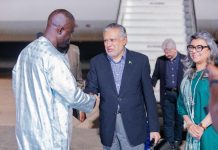FAISALABAD, July 12 (TNS): Pakistan Textile Exporters Association (PTEA) has expressed great concerned over undue delay in payment of outstanding refunds despite firm commitment of the government in budget 2017-18.
Refunds have unfortunately been accumulated to over Rs.200 billion and are adversely affecting the cash flow of exporters.
In a statement issued here on Wednesday, Chairman PTEA Ajmal Farooq has said that Finance Minister Senator Ishaq Dar had announced during his budget speech that all pending sales tax refunds whom Refund Payment Orders (RPOs) have been sanctioned by April 30, 2017 shall be paid in two parts. RPOs up to the value of Rs.1 million will be paid till July 15, and the remaining will be paid till August 14, 2017. Unfortunately, on ground nothing has yet been done in this regard and textile exporters are still deprived of their basic working capital blocked in refund regime, he said.
Expressing disappointment over non serious attitude, Ajmal Farooq said that Government has released only Rs. 3 billion for payment of Drawback of Taxes under Prime Minister’s package in six months against the requirement of Rs. 7.29 billion per month. Furthermore, Rs. 4 billion only are been earmarked against the Rs. 180 billion P.M’s package in federal budget, besides holding drawbacks, sales tax and custom rebate refund claims of Rs. 200 billion, creating serious liquidity crunch for the textile industry, negatively affecting production capacity and resulting in ultimate decline in the exports.
The Chairman PTEA stressed for immediate payment of all outstanding refunds for which RPO’s has been issued and unprocessed refund claims be processed to improve the liquidity of the textile industry.
He said that finance is imperative to run the wheels of industry but without this, no one could even think to run the industry.
Government should set its priorities right and accord preferential treatment to boost the exports and generate industrial activities.
Ajmal Farooq was of the view that due to high input cost including energy prices, Pakistani textiles are no more competitive in the international market and instead of making announcements only government should take practical measures to arrest the falling exports.
Elaborating he said that gas, the major production element in textile manufacturing, is available at around
Rs. 1,000 /MMBTU in Pakistan against Rs. 400 in Bangladesh. Similarly electricity tariff for industry is
Rs. 10.5/kwh; whereas it is Rs. 7/kwh in other regional countries including Bangladesh. Furthermore, industry is burdened with Rs. 3.63/kwh surcharges on electricity and GIDC on gas which cannot be passed on to international buyers, he said and added that with such high prices of energy, textile industry is unable to compete in the international market.














Comments are closed.